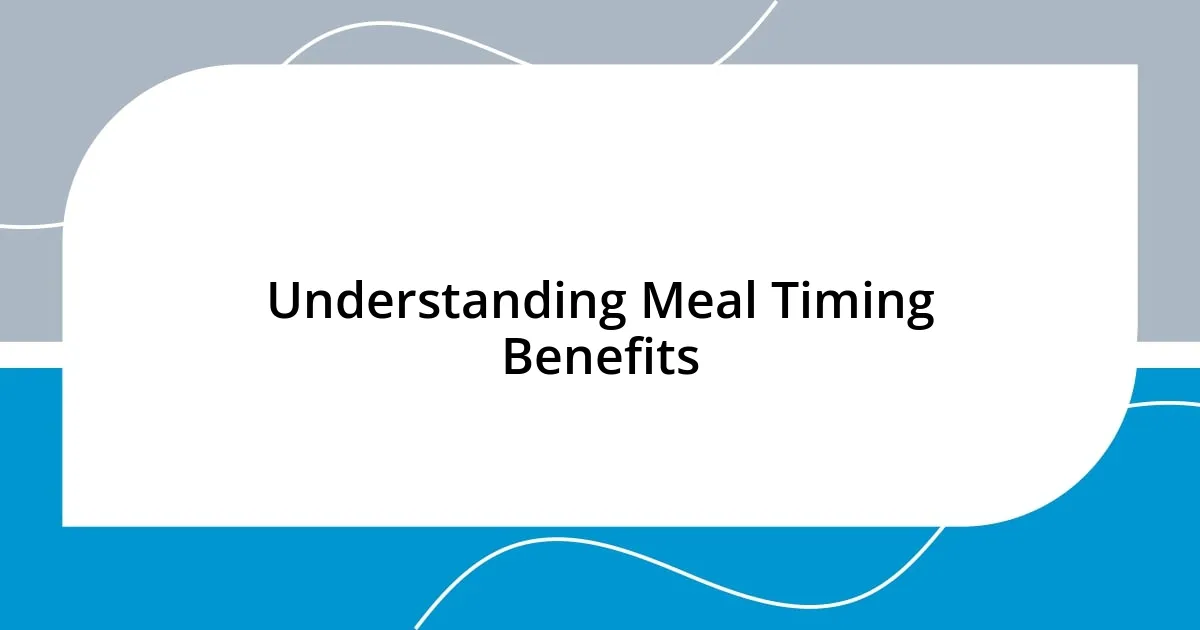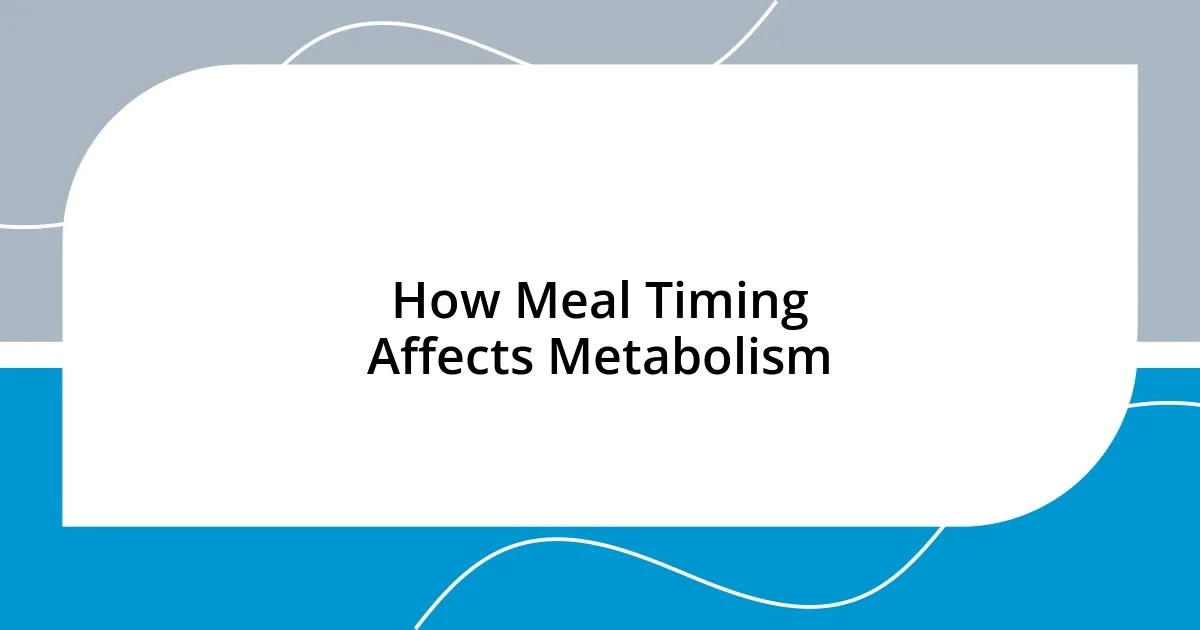Key takeaways:
- Meal timing significantly influences physical well-being, energy levels, and productivity throughout the day.
- Eating breakfast within an hour of waking boosts metabolism and sets a positive tone for the day.
- Shifting dinner to earlier in the evening improves sleep quality and reduces late-night cravings.
- Consistency in meal timing is crucial for maintaining balance and fostering a healthy relationship with food.

Understanding Meal Timing Benefits
Meal timing can significantly influence not just how we feel physically but also how we approach our daily routines. I recall a period when I experimented with intermittent fasting, feeling a remarkable clarity during those fasting hours. I started to wonder, could the timing of my meals be more essential than what I was actually eating?
Similarly, I discovered that having breakfast consistently within an hour of waking up energized my mornings. It wasn’t just about fueling my body; it set a productive tone for the day. Have you noticed how when you skip breakfast, you might feel sluggish or struggle to concentrate? This simple act of timing transformed my mornings from chaotic to calm.
Moreover, I’ve found that eating dinner earlier in the evening led to better sleep quality for me. There’s something so comforting about allowing your body to digest before bed, and it’s as if my mind finally clicked into a peaceful state. Isn’t it interesting how our body rhythms shift with meal timings? The more I pay attention to this, the more convinced I am of its benefits.

My Personal Meal Timing Journey
I vividly remember when I first decided to restructure my meal timings. Late-night snacking was a habit I never questioned; however, I felt lethargic each morning. Once I shifted to having dinner by 6 PM, I experienced a noticeable shift in my energy levels the following day. There’s something empowering about taking control of when you eat, and I felt more in tune with my body’s needs.
During my meal timing journey, I began to notice how stress impacted my eating schedule. On particularly hectic days, I would forget to eat lunch and, after hours of emptiness, I’d often binge later in the evening. This rollercoaster of hunger and fullness led to discomfort. I learned that prioritizing regular meal breaks—even when life gets busy—helped me maintain a better sense of well-being and steadier energy throughout the day.
On weekends, I indulged in a more relaxed schedule, enjoying brunches with friends. While I cherished these moments, it struck me that returning to the routine of scheduled meals on weekdays was necessary for my overall health. Balancing flexibility with consistency became a key lesson in my personal journey, highlighting the impact of meal timing not just on my body but also on my mental health.
| Meal Timing | Effects |
|---|---|
| Eating Dinner Earlier | Improved energy levels the next day |
| Consistent Breakfast | Enhanced productivity and mood |
| Frequent Meal Breaks | Reduced stress and better well-being |

How Meal Timing Affects Metabolism
Experimenting with meal timing has taught me that when I eat can be just as crucial as what I consume. For a time, I noticed that having meals at specific intervals not only impacted my energy but also how my body processed food. When I committed to a structured routine, I felt lighter, both physically and mentally, as if the bloat from inconsistent eating patterns lifted.
Here are some key insights from my experiences:
- First Meal Timing: I found that having my first meal within an hour of waking up supercharged my metabolism for the day.
- Evidence of Early Dinners: Eating dinner earlier allowed my body to digest while I unwound, ultimately helping me wake up feeling refreshed.
- Consistency Matters: Sticking to meal times built a rhythm that made my metabolism work more efficiently, breaking down food at opportune moments rather than forcing it to catch up.
Mindfully adjusting the times I chose to nourish myself has offered a profound sense of alignment with how I function throughout my day. This shift made me more aware of my cravings and hunger signals, leading to a far healthier relationship with food.

Meal Timing and Weight Management
I’ve often wondered how much our meal timings really play into the weight management equation. For instance, I used to think that as long as I was eating healthy foods, I was on the right track. However, I realized that eating a large dinner close to bedtime left me feeling sluggish and, quite frankly, a bit too full to get a good night’s sleep. This experience made me consider how timing can dramatically impact not just my waistline but my overall mood and energy.
One particular evening, I decided to try an experiment where I shifted my main meal to earlier in the day. I was amazed—not only did my hunger cues feel more balanced, but I found that I wasn’t constantly battling cravings later in the night. Have you ever experienced that post-dinner snack attack? I used to feel it daily! But with earlier meal timings, those late-night snacks became a rare occasion instead of a regular habit.
Additionally, I’ve learned that consistency is key. By keeping my meals at similar times each day, I developed a sense of routine that my body seemed to respond to positively. It felt freeing to realize that I didn’t need to deprive myself to maintain my weight; rather, it was about deciding when to eat that made all the difference. With a few adjustments, I became more in tune with my body’s signals, and I truly believe that meal timing can be a game-changer in the journey of weight management.

Common Myths About Meal Timing
It’s easy to get caught up in the idea that eating late at night is a surefire way to gain weight, but my experience tells a different story. I used to believe this myth wholeheartedly—thinking that an evening meal would derail my healthy habits. Yet, I discovered that it wasn’t the timing alone that made the difference; rather, it was about the choices I made during those late-night meals. When I opted for lighter options, I felt satisfied without the heaviness that usually kept me awake.
Another myth I once subscribed to was the notion that skipping breakfast automatically puts your metabolism in a downward spiral. I can tell you from my own trial and error that this isn’t the whole truth. There were mornings when I simply wasn’t hungry, and forcing myself to eat didn’t help me feel energized; it just felt like a chore. Instead, learning to listen to my body allowed me to embrace flexibility in my meal timing without the guilt. Have you ever skipped a meal and felt perfectly fine? Sometimes our bodies know best.
Lastly, there’s this persistent belief that meal timing rules are one-size-fits-all. I used to read countless articles claiming strict meal schedules were necessary for everyone, but honestly, I found such rigidity stifling. By experimenting with different timings, I learned to adapt based on my personal rhythms and lifestyle. Sometimes I had lunch later than usual, and it worked wonders for my productivity and mood. Finding what works best for you is truly a journey, and it’s okay to redefine the rules as you learn more about your own body.
















